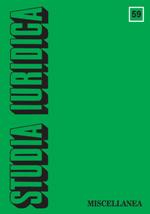Ramy prawne satyry
Legal Framework of Satire
Author(s): Maria Gołda-SobczakSubject(s): Law, Constitution, Jurisprudence
Published by: Wydawnictwa Uniwersytetu Warszawskiego
Keywords: prawo; nauki prawne; teoria i praktyka prawa; law; legal science; theory and pratcical law
Summary/Abstract: Although satirical works by their nature are one of the literary genres and artistic creations, the satire framework is introduced by law. The first regulations on this subject can be found in Poland in the period of the Republic of Nobles. During the Partitions of Poland the responsibility for the publication of a satirical work was associated with the liability for defamation or possibly for an insult. The Criminal Code of 1932 and later the Criminal Code of 1969 were heading towards this conviction. The censorship was an effective barrier to political satire. For a long time there were no specific differences between a defaming satirical piece of work and a scientific, artistic or derived from political beliefs criticism that is defamatory in its content. The freedom of criticism is part of the freedom of speech and is considered to be a circumstance repealing liability (Article 41 of the Press Law). The negative reviews of scientific and academic works or other creative, professional or public activity are used as implementation of tasks of the press defined in the Article 1 of the Press Law and, therefore, these reviews are protected by law. This principle, by the Article 54b of the Press Law, was extended to all messages of the critical character. Although a satire authorizes the use of stricter measures of literary expression, it does not allow the breach of other people’s personal rights. A satire – as noted by the Supreme Court – cannot exceed the barrier beyond which a sphere of personal rights protected by law is located.
Journal: Studia Iuridica
- Issue Year: 2014
- Issue No: 59
- Page Range: 71-94
- Page Count: 24
- Language: Polish

